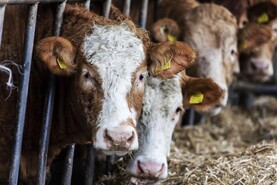The educational requirements of the Young Farmer Scheme (YFS) and National Reserve have changed significantly since 2015. However, they are still causing issues.
Adam Garland is a young farmer from Monaghan, where he farms with his father. They keep beef, sheep and also have a poultry enterprise on the farm. Adam’s father works full-time off-farm, while Adam is in first year of college, undertaking a level eight bachelor of science in sustainable agriculture at Dundalk Institute of Technology. The course is run in conjunction with Ballyhaise Agricultural College.
“Up until last year, the course was incremental,” according to Adam. “After two years, we would get a Level 6 degree, after three years a Level 7 and after four years a Level 8. However, this was changed last year, with the course running as a full four-year Level 8 course, with no qualification until we finish college.”
Lack of clarity
The terms of the YFS outline that to be eligible under the scheme, an applicant must have successfully completed an agricultural qualification at FETAC Level 6 or its equivalent by 15 May 2018 and must submit a copy of such qualification /Teagasc letter of equivalence in support of their application. What courses this letter of equivalence entails is as of yet unclear.
The Department does not make a determination in relation to these cases and has no role in decisions in relation to the courses accepted as a result of a request for a letter of equivalence for the purpose of an application under the schemes. This role is carried out independently by Teagasc.
Where an applicant has completed their course by 15 May 2018, but has not received their final certification, they can submit a confirmation of education form.
To be eligible, applicants must have not only completed all course work, but also have completed all exams.
Students should seek their final exam timetable before they make an application. For example, the UCD exam timetable generally runs for two weeks in the middle of May, with some exams falling after 15 May, so your individual timetable will dictate whether you are eligible for both the National Reserve or YFS.
“I would be better off if I dropped out after two years than to do a four-year course,” according to Adam. “If I dropped out after the two years I would have a Level 6 and be eligible for both the YFS and the National Reserve. I asked Dundalk IT and Ballyhaise Agricultural College and neither of them will give me a letter of equivalence after two years of the course.
I do the same hours in college as a teacher works, but yet I have to wait until I finish the four years before I am eligible as a young farmer, which is ridiculous
“When I finish college I want to go home and farm, but I get no reward for working harder and pushing myself further to do the four-year course. I work on the farm in the mornings before college, in the evenings and at the weekends, realistically I wouldn’t spend as much time on the farm if I was working full-time off-farm and farming part-time too.
“We finish college for the summer in the first week of May until the middle of September, I do the same hours in college as a teacher works, but yet I have to wait until I finish the four years before I am eligible as a young farmer, which is ridiculous. It is difficult to make decisions and plan ahead, one year there could be a National Reserve, but the next year there may not be so how can a young farmer plan for that? There could be big changes to CAP post-2020 and I would like to be ready and eligible as a young farmer when these changes come, but with the current system I won’t be eligible until at least 2021.”
In 2015 applicants only had to be enrolled in the course by 15 May to be eligible for both the National Reserve and the YFS. In 2016 there was no National Reserve, while in 2017 applicants had to have their course completed by the 15 May. Now, in 2018, young farmers are unsure at what stage of their course they have to be to get a letter of equivalence. Clarification is being sought from Teagasc.






 This is a subscriber-only article
This is a subscriber-only article










SHARING OPTIONS: